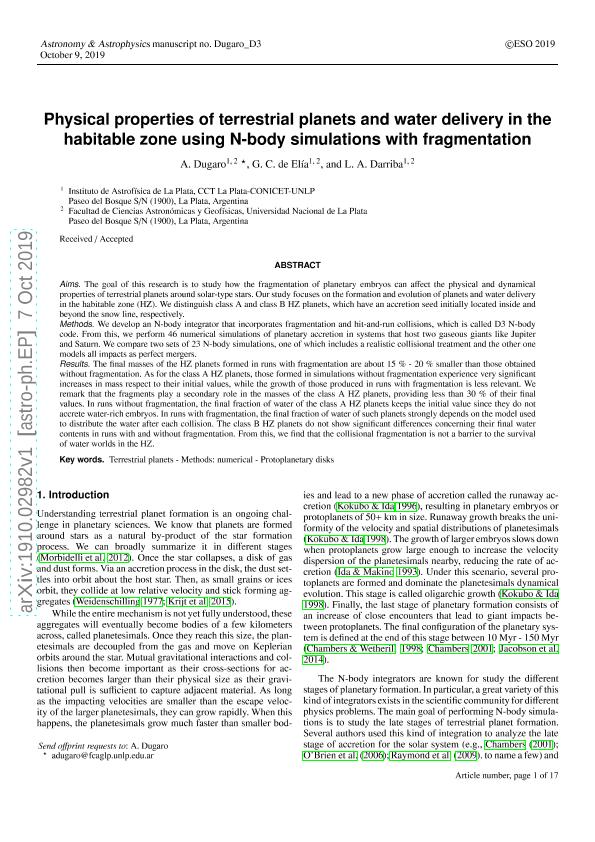Artículo
Physical properties of terrestrial planets and water delivery in the habitable zone using N-body simulations with fragmentation
Fecha de publicación:
13/11/2019
Editorial:
EDP Sciences
Revista:
Astronomy and Astrophysics
ISSN:
0004-6361
Idioma:
Inglés
Tipo de recurso:
Artículo publicado
Clasificación temática:
Resumen
The goal of this research is to study how the fragmentation of planetary embryos can affect the physical and dynamical properties of terrestrial planets around solar-type stars. Our work focuses on the formation and evolution of planets and water delivery in the Habitable Zone. We distinguish class A and class B HZ planets, which have an accretion seed initially located inside and beyond the snowline, respectively. We develop an Nbody integrator that incorporates fragmentation and hit-and-run collisions, which is called D3 N-body code. From this, we perform 46 numerical simulations of planetary accretion in systems that host two gaseous giants like Jupiter and Saturn. We compare two sets of 23 N-body simulations, one of which includes a realistic collisional treatment and the other one models all impacts as perfect mergers. The final masses of the HZ planets formed in runs with fragmentation are about 15%-20% smaller than those obtained without fragmentation. As for the class A HZ planets, those formed in simulations without fragmentation experience very significant increases in mass respect to their initial values, while the growth of those produced in runs with fragmentation is less relevant. We remark that the fragments play a secondary role in the masses of the class A HZ planets, providing less than 30% of their final values. In runs without fragmentation, the final fraction of water of the class A HZ planets keeps the initial value since they do not accrete water-rich embryos. In runs with fragmentation, the final fraction of water of such planets strongly depends on the model used to distribute the water after each collision. The class B HZ planets do not show significant differences concerning their final water contents in runs with and without fragmentation. From this, we find that the collisional fragmentation is not a barrier to the survival of water worlds in the HZ.
Palabras clave:
TERRESTRIAL PLANETS
,
METHODS: NUMERICAL
,
PROTOPLANETARY DISKS
Archivos asociados
Licencia
Identificadores
Colecciones
Articulos(IALP)
Articulos de INST.DE ASTROFISICA LA PLATA
Articulos de INST.DE ASTROFISICA LA PLATA
Citación
Dugaro, Agustin; Elías, Gabriela del Valle; Darriba, Luciano Ariel; Physical properties of terrestrial planets and water delivery in the habitable zone using N-body simulations with fragmentation; EDP Sciences; Astronomy and Astrophysics; 632; A14; 13-11-2019; 1-17
Compartir
Altmétricas




